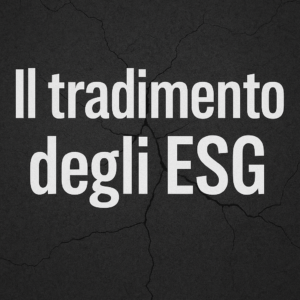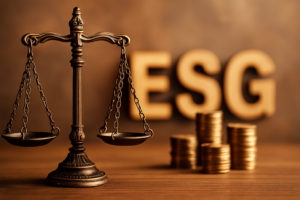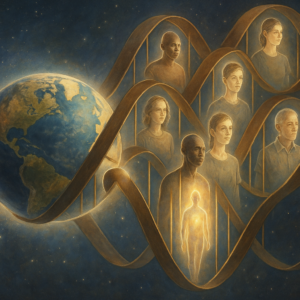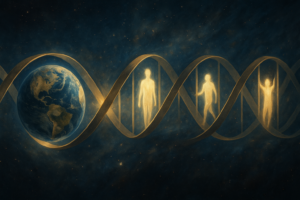(The Betrayal of ESG – Ep. 1)
Once upon a time, there were the ESGs: Environmental, Social, Governance. A dream born from the rubble of global crises, to say that yes, another kind of economy was possible. An economy that measured not just profits, but respect for the Earth, for people, for democracy. A signal—imperfect, yet necessary—that behind every investment, there could be a vision of a fairer, greener, more humane future.
Today, those same ESGs are changing their name. With a play on letters, a symbolic and substantive metamorphosis. From now on, ESG will stand for Energy, Security, Geostrategy. No longer environment, society, governance. But energy, security, geopolitics. No longer care, but control. No longer peace, but defense. No longer a sustainable tomorrow, but a militarized today.
As reported by Reuters on May 6 2025, the European stock exchange operator Euronext (ENX.PA) announced a series of measures to “encourage investment in the defense sector,” facilitating stock listings, bond issuance, and supporting new IPOs through the IPOready Defence program, funded by the European Union.
This move follows a political push to increase defense spending and reduce dependence on U.S. arms, after criticism from the Trump administration claiming that Europe “does not spend enough on its own security” (Reuters, 2025).
A New Geopolitical Order
In a statement, Euronext CEO and Chairman Stephane Boujnah explained that this strategy aims to respond to a “new geopolitical order”, as European defense companies “have expressed the urgent need to invest heavily in their innovation and production capacities to ensure Europe’s strategic autonomy over the next decade” (Reuters, 2025)—and, at the same time, to turn a dream into a nightmare.

Among the measures, Euronext announced its intention to revise ESG index methodologies to limit the current exceptions granted to companies in the defense sector, and will encourage rating agencies to narrow the definition of “controversial weapons” only to activities prohibited by relevant international treaties. It also confirmed plans for a new series of ESG indices—focused on energy, security, and geostrategy—first presented in March. These indices may be used to measure sector performance and serve as the basis for fund creation (Reuters, 2025).
And as if the atrocities weren’t enough, Reg Watson, an analyst at ING—whom I now have a strong urge to meet in person—said that “promoting IPOs in defense is useful, but in the end it’s the market that determines their success or failure, not Euronext.”
The market. What is the market, Reg? Who is the market, Reg? What goals does the market have, Reg? The market doesn’t determine a damn thing (!?), dear Reg. The market determines only itself—and those who, like you, Reg, would like the market to determine everything, starting with themselves.
But what kind of future lies behind these moves?

No more exclusions, no more moral boundaries: an open invitation to finance the arms race, disguised as a “responsible” investment. There was a time when Ethical Funds could not invest in weapons. Today, they are preparing to do just that—legitimized by a new narrative: one in which security comes before everything, one in which Europe must “arm itself to protect itself.”
But protect itself from whom? And at what cost? Isn’t that the darkest paradox of all? In the race for strategic autonomy, we are sacrificing precisely the values that were supposed to make us free: respect for life, peace, solidarity, dignity, and fundamental rights and freedoms. Aren’t we turning fear into an alibi to perpetuate violence?
From the funeral of values to the funeral of the planet?
I remember when, at Pope Francis’ funeral, world leaders gathered in a symbolic embrace, moved (truly?) by his words of hope. I remember his appeals for an economy in service of life, for a disarmed world.
Now, with Pope Leo XIV calling us to a “disarmed and disarming peace,” I wonder: will they listen this time? Or will this voice too be drowned out by the noise of lobbies, markets, and wars presented as inevitable?
Are we truly preparing for peace, or merely equipping ourselves for increasingly sophisticated wars?
For whom are we building this fortified, militarized, hyper-competitive future?

Perhaps, if we look closely, Elon Musk was right: “Earth will end, and I’ll take you all to Mars.”
Because if Earth becomes nothing but a battlefield, an arms market, an arena of mutual fear, then there really will be no place left for humanity. But before boarding that rocket, before declaring our planet a failure, we still have a choice.
We still have the chance to say “No!” To choose a different path. To stop confusing security with weaponization, stability with deterrence, progress with the accumulation of instruments of death, wealth with prosperity. Above all, to stop confusing answers with questions.
There’s no more time for this time

We still have time for an economy that does not surrender to the logic of force. But that time is running out. And so today, more than ever, the question is one:
What kind of future do we truly want to finance?
The Spherical Economy believes that the impact of the future must be pursued with the explicit intent of becoming the best not in-the-world but for-the-world.
For this to happen, we must consciously aim to impact the 8 levels that make up the Model of the 8 Ps, and in each of them, revitalize the magic of ESG:
Outern Person
- ESG → Empathy, Service, Generosity
(Empathy toward others, Service to others, Generosity to others)
People
- ESG → Equity, Solidarity, Growth
(Equity among people, Solidarity, Collective growth)
Partnership
- ESG → Engagement, Synergy, Gratitude
(Genuine engagement, Collaborative synergy, Mutual gratitude)
Profit
- ESG → Ethical, Sustainable, Gain
(Ethical and sustainable profit)
Prosperity
- ESG → Empowerment, Stewardship, Growth
(Empowerment, Responsible stewardship, Prosperous growth)
Planet
- ESG → Earth, Stewardship, Green
(Care for the Earth, Responsibility, Environmental sustainability)
Peace
- ESG → Equity, Serenity, Goodwill
(Equity, Serenity, Goodwill)
Inner Person
- ESG → Essence, Soul, Growth
(Essence, Soul, Inner growth)

Source: Reuters, May 6, 2025, https://www.reuters.com/it/azienda/euronext-cambia-senso-esg-per-sostenere-settore-difesa-europea-2025-05-06/

